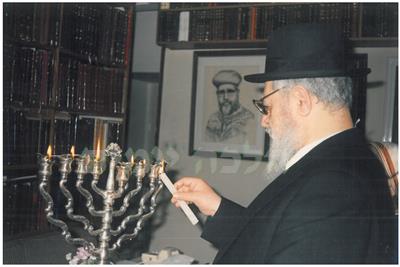









לוח זמני תפלה לחורף תשפ״א
מוצאי שבת | ערבית | שקיעה | מנחה שבת | סוף זמן קריאת שמע | הדלקת נרות | מנחה וקבלת שבת | תאריך | שבת פרשת |
Shabbat Ends | Arbit | Sunset | Minha | Shema before | Candle Lighting | Minha & Kabbalat Shabbat | Date | Parasha |
PM | PM | PM | PM | AM | PM | PM |
|
|
5:00 | 4:55 | 4:00 | 3:25 | 10:19 | 3:45 | 3:45 | 1/2 Jan | ויחי |
Q & A on Parashat Vayechi
All references are to the verses and Rashi’s commentary, unless otherwise stated.
- Why is kindness towards the dead called “chesed shel emet” — kindness of truth?
47:29 – Because the giver expects no reward from the recipient. - Give three reasons Yaakov didn't want to be buried in Egypt.
47:29 – a) Egypt's ground was to be plagued with lice; b) At the time of the resurrection, those buried outside Israel will suffer; c) So the Egyptians wouldn't make him into an idol. - How do you treat a “fox in his time” (i.e., a commoner who rules)?
47:31 – Bow to him. - “When I was coming from Padan, Rachel died on me… I buried her there on the way to Efrat…” Why did Yaakov say all this to Yosef?
48:7 – Yaakov thought Yosef harbored resentment since Yaakov had not buried Yosef's mother, Rachel, in the Ma'arat HaMachpela. - Initially, why was Yaakov unable to bless Efraim and Menashe?
48:8 – The Shechina departed from him. - What does pillalti mean?
48:11 – “I thought.” - What does “Shechem” mean as used in this week's parsha? (two answers)
48:22 – a) The actual city of Shechem; b) A portion. - Which individual is called “the Emori“? Why? Give two reasons.
48:22 – Esav. a) He acted like an Emorite; b) He trapped his father with words (imrei pi). - What did Yaakov want to tell his sons but was unable to?
49:1 – When mashiach will come. - What privileges did Reuven lose due to his rash actions?
49:3 – Priesthood and Kingship. - What congregation from Yaakov's offspring did Yaakov not want to be associated with?
49:6 – Korach and his congregation. - What did Yehuda do after he heard Yaakov rebuke Reuven, Shimon and Levi? Why?
49:8 – He drew back. He was afraid that Yaakov would rebuke him for the incident with Tamar. - What does milk do to teeth?
49:12 – It makes them white. - Why is Yissachar like a “strong-boned donkey”?
49:14 – Just as a donkey bears a heavy burden, so the tribe of Yissachar bears the yoke of Torah. - With what resource did both Yaakov and Moshe bless Asher?
49:20 – Oil-rich land. - In Yosef's blessing, Yaakov said, “They embittered him…” Who are “they”?
49:23 – Yosef's brothers, Potifar and his wife. - Which descendants of Binyamin “will divide the spoils in the evening”?
49:27 – Mordechai and Esther. - From whom did Yaakov buy his burial place?
50:5 – From Esav. - What oath did Yosef make to Pharaoh?
50:6 – Yosef swore not to reveal Pharaoh's ignorance of Hebrew. - Which two sons of Yaakov did not carry his coffin? Why not?
50:13 – Levi, because he would carry the aron (holy ark). Yosef, because he was a king.

האם
שלג הוא מוקצה בשבת – מעשה מהגאון רבי צבי פסח פראנק
שאלה: האם שייך איסור “מוקצה” בשלג היורד
בשבת?
תשובה: כתב מרן הבית יוסף (סוף סימן שי), בשם השבלי
הלקט, בשם רב צמח גאון, “מטר היורד בשבת, מותר לרחוץ ולשתות ממנו, אף על פי
שלא היו עננים מאתמול“. כלומר, אין איסור מוקצה
בגשמים היורדים בשבת, וכל שכן שלא שייך איסור מוקצה על מי הגשמים שירדו עוד לפני
כניסת השבת.
וכן מוכח עוד
ממה שפסק מרן השלחן ערוך (סוף סימן שלח), שמי שנתן כלי בביתו במקום שזולפים מי
גשמים, מותר לטלטל את הכלי עם המים שבו. מוכח מכאן, שאין איסור מוקצה במי הגשמים.
[שורש הדבר שאנו
דנים בכלל מצד איסור מוקצה במי הגשמים, הוא משום “נולד”, וכגון ביצה
שנולדה בשבת, שאסור לאכול ממנה עד למוצאי שבת. ולא נאריך כאן בפרטי הדינים השייכים
לזה, כי להלכה מבואר בגמרא במסכת עירובין (דף מו.) שלא שייך איסור “מוקצה מחמת
נולד” במי הגשמים, אבל במים היוצאים מן המזגן בשבת, יש אומרים שיש בהם איסור
מוקצה. ועיין במה שכתב בזה מרן זצ”ל בספר חזון עובדיה ח”ג עמוד קמד)
עיין שם].
והגאון רבי צבי
פסח פראנק, רבה של ירושלים, שהיה גדול הדור למעלה מחמשים שנה, כתב בספרו שו”ת
הר צבי (עמוד רפח) בזו הלשון: “בשבת, ראש חודש אדר תשי”ז, ירד שלג כבד,
ונשאלתי אם יש בו איסור מוקצה ואסור בטלטול. ונראה שהדבר פשוט לגבי שלג שירד בערב
שבת, שבודאי אין בו חשש של מוקצה מצד עצמו, כמו שמוכח במסכת שבת ש”מרסקין את
השלג לתוך המים”, וכיון שהשלג מצד עצמו אין בו חשש של מוקצה, פשוט שגם אם ירד
בשבת, דינו שווה לגמרי לדין מטר (גשם) שירד בשבת, שאינו מוקצה“.
ולגבי גריפת
השלג משטח הכניסה לבית על ידי מעדר וכדומה (כשיש שם עירוב, ומותר לטלטל באותו
מקום). כאשר הקרקע מתחת לשלג היא מרוצפת, או מכוסה אספלט וכדומה, אף שיש מחמירים
שלא לפנות את השלג לצדדים, משום שהדבר כרוך בטרחה גדולה, והביאו ראיות
לדבריהם, מכל מקום למעשה פסק מרן זצ”ל (בספרו שם), שלהלכה יש להקל בזה, ובפרט
במקום שיש חשש שיבואו לידי החלקה ונפילה, שאז יש להקל בזה יותר בפשיטות, וכן יהיה
מותר לפזר מלח על גבי הקרח, כדי למהר את הפשרתו, שלא יהיה למכשול.
ולסיכום: השלג היורד בשבת, הרי הוא מותר בטלטול בשבת,
ומותר לשתות ממנו. ומעיקר הדין מותר לפנות מן הכניסה לבית את השלג לצדי הדרך,
(בתנאי שיש שם עירוב וכדומה, שאם לא כן אסור לטלטל בלאו הכי שום דבר).
ואגב שהזכרנו את
הגאון רבי צבי פסח פראנק, נספר בזאת, כי הגאון היה מגדולי גאוני ישראל שהאירו את
שמי העולם בתורתם וצדקתם. ומרן רבינו עובדיה יוסף זצ”ל, היה ממקורביו, עוד
מימי בחרותו, שהיה מרן זצ”ל מגיע לביתו של רבי צבי פסח פראנק, להשתתף
בשיעורים שהיה מוסר מידי שבת לטובי הלמדנים בירושלים. שבת אחת, התאחר מעט מרן
זצ”ל, וכשכבר ישב הרב פראנק במקומו והחל נושא דבריו, נכנס מרן
זצ”ל לחדרו. (היה זה בערך בשנת תשי”ב, כשהיה מרן בן שלושים שנה).
תיכף
קם הגאון לכבוד מרן זצ”ל, אף שהיה צעיר לימים. וכל תלמידי הרב פראנק המה ראו
כן תמהו, מה כל החרדה הגדולה הזאת אשר חרד גאון ישראל מפני אותו אברך צעיר. אחד
מהם העז פניו, ופנה לרבי צבי פסח בשאלה, מאיזו סיבה כבוד הרב קם בפני זה
ה”פרענק”? השיבו רבי צבי פסח, זה הפרענק יהיה המשיב של הדור הבא!
וגם לאחר מכן
במשך רבות בשנים, עמד רבי צבי פסח לימין צדקו של מרן זצ”ל, וחיזקו הרבה מאד,
והאיר עליו מאורו הגדול, כמו שכתבנו באריכות בספרי אביר הרועים חלק ראשון וחלק שני.
כל האמור
בדברינו, נודע לעצם טלטול השלג בשבת. אבל שאלת דחיסתו כדי לעשות ממנו מין כדור,
וכן בניית דמות או בית על ידי שלג בשבת, נוגעת לאיסור משום “בונה“,
ויש
מגדולי הפוסקים שחיוו דעתם בזה לאסור, והביאו ראיה לזה מלשון הרמב”ם
המפורסמת, ש”כל המקבץ חלק אל חלק ודבק הכל עד שיעשו גוף אחד – דומה לבנין“.
ולכן
לענין זה אין להקל.
Is Snow Muktzeh on Shabbat?
Question: Does
the prohibition of Muktzeh apply to snow that falls on Shabbat?
Answer: Maran
Ha’Bet Yosef (end of Chapter 310) quotes the Shiboleh Ha’Leket who quotes Rav
Tzemach Gaon who writes, “One may wash with or drink rainwater that fell on
Shabbat although there were no clouds the day before.” This means that rain
that falls on Shabbat is not Muktzeh and thus, rain which fell before the onset
of Shabbat is certainly not Muktzeh.
This can likewise be inferred from the ruling of Maran
Ha’Shulchan Aruch (end of Chapter 338) that if one places a vessel in one’s
home in a place where rain is leaking into the house, the vessel with the water
inside. This implies that the prohibition of Muktzeh does not apply to
rainwater.
(The root of the discussion whether or not Muktzeh
applies to rainwater is due to the prohibition of “being born” or coming into
existence on Shabbat, such as an egg laid on Shabbat, which cannot be eaten
until Motza’ei Shabbat. We shall not delve into this law at length because
halachically speaking, the Gemara (Eruvin 46a) rules that the prohibition of
Muktzeh does not apply as the result of an object’s coming into existence on
Shabbat. Nevertheless, some rule that water dripping from an air conditioner on
Shabbat does retain a Muktzeh status. See Maran zt”l’s discussion in his
Chazon Ovadia, Shabbat-Part 3, page 144.)
Hagaon Harav Tzvi Pesach Frank zt”l, late Chief
Rabbi of Jerusalem and the leading halachic authority of the generation for
over fifty years, writes in his Responsa Har Tzvi (page 288), as follows: “On
Shabbat, Rosh Chodesh Adar of the year 5717 (1957), there was heavy snowfall in
Jerusalem. I was asked if the snow is Muktzeh and forbidden to move. Clearly,
snow which fell on Erev Shabbat is not Muktzeh in and of itself as the Gemara
in Masechet Shabbat states, ‘One may crush snow into water on Shabbat.’ Since
snow is innately non-Muktzeh, the same law will apply if it falls on Shabbat
and it shares the law of rain which falls on Shabbat and is not Muktzeh.”
Regarding shoveling snow with a shovel or any other tool
(when there is an Eruv and carrying is permissible), when the ground under the
snow is layered, such as asphalt or cement, although there are those who rule
stringently and forbid moving the snow aside because this is a great bother on
Shabbat, nevertheless, Maran zt”l (ibid.) rules that there is room for
leniency in this regard, especially when one may slip and fall as a result of
not shoveling. It is likewise permissible to spread salt on the snow so as to
cause it to melt faster.
Summary: Snow
which falls on Shabbat may be moved and may be used to drink. According to the
letter of the law, one may shovel snow from the entrance to one’s home on
Shabbat (as long as there is an Eruv in the area without which nothing may be
carried).
Nevertheless, this applies only to moving snow on
Shabbat. However, pressing snow into snowballs, snowmen, or igloos is similar
to the forbidden work of building on Shabbat and several Poskim who prohibit
this rule this way based on the wording of the Rambam that “gathering piece by piece
and sticking them together until they become one unit is similar to building.”
Thus, one should not act leniently regarding this issue.




















